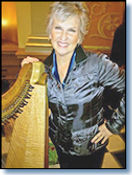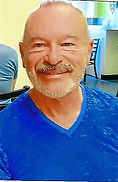
About

“The doctors and nurses talk to me and I don’t understand. If you sang or talked to me, I could not understand your language. But this language I understand. In music we have the same language.”
~ Patient, through a translator, Carmichael, CA
“Don’t leave!
The music soothes us too!”
~ NICU doctor, Carmichael, CA
Testimonials
"Thank you for visiting me in the hospital and soothing both my mind and body with your beautiful music. I have now healed from my surgery but will always remember your visit as a bright moment in my recovery. The service you provide is priceless."
~ Patient
"It was a very uplifting experience for both my wife and me. It was a time to relax, slow down, and be renewed. It brought a deep inner peace."
~ Patient
"Your music caused chills up my back, which soon resolved. A deep sense of peace came over me and I let go of my tension. I was then able to share some very close moments with my mom. I will never forget this experience."
~ Daughter of Patient
"I will never forget one time you came a couple years ago. It was crazy that day -- we had so many confused patients and everyone was agitated and upset. We were all so stressed. You started to play in the day room, and little by little things calmed down until everyone was quiet and relaxed. I'll always remember that day. You made such a difference!"
~ Cathie, Unit Assistant,
Eskaton Care Center, Fair Oaks, CA
“Over the past years we have seen our residents truly benefit from this type of therapy. We have seen residents who are usually agitated calm down, residents who were non-verbal and in pain seem more relaxed… We even had a resident who is non-verbal respond to their music by humming along and giving us a big smile. Priceless.”
~ Social Worker, Fair Oaks, CA
“I had the pleasure of experiencing firsthand listening to [the practitioner] play to two patients and subsequently playing for my mother, who was a patient at the time… I found the experience to be very gratifying and exceedingly relaxing… I am a great believer in integrative medicine and specifically feel that music is a wonderful addition to the healing process.”
~ ICU Doctor, Folsom, CA
“Today an infant on a high-flow nasal canula had to have oxygen increased while Mom was holding him, due to dropping oxygen saturation. As the harp was played, the infant’s sats increased, O2 requirements dropped, and respiratory rate decreased.”
~ Nurse, Carmichael, CA

"We are so glad to see you every time you come. Your music comforts the patients, but it also comforts the staff too, and we really need it."
~ Jeanette, Unit Assistant,
ICU Kaiser Roseville
“We are very pleased with the therapeutic music that music practitioners provide at our facility. This group of dedicated professionals definitely contributes to the quality of life of our residents. Our residents and their families often report to us the benefits of the therapeutic music such as: feeling much more relaxed, being in less pain, and feeling less anxious. They are an essential part of our team. Often, when all of our attempts to get the person out of their shell fail, it happens that these music practitioners are the only ones that are able to help them start their healing. Their expertise in therapeutic music touches them deeply. As they play their harps they really tune into a person’s soul. It provides peace and healing.”
~ Danijela Stroud, Activities Director,
Eskaton Care Center Fair Oaks
Locations

Eskaton Skilled Nursing
-
Fair Oaks
-
Greenhaven
-
Manzanita
-
Walnut, (Carmichael Village)

Kaiser Permanente
Sacramento
Medical Center

Kaiser Permanente
Roseville
Medical Center

Kaiser Permanente
San Rafael
Medical Center

Sutter Auburn
Faith Hospital

Kaiser Permanente
Santa Rosa
Medical Center

Sutter Care
At Home Hospice

Mercy General Hospital
Sacramento

Sutter Roseville
Medical Center

Snowline
Hospice

UC Davis
Sacramento
Medical Center
Our Team
Music Partners in Healthcare was officially founded in 2008. Each member is trained and certified in the use of their instrument as a therapeutic tool. We currently have members certified on harp, flute, Native American Flute, guitar, voice, and clarinet. Members must complete the educational and internship requirements of the National Standards Board and must subscribe to our Code of Ethics. We typically work within established healthcare organizations where we serve as part of a dedicated team in addressing the physical, emotional, and spiritual needs of patients.
Officers

Elizabeth Bogdanovich
President

Linda Maples
Secretary

Laura Caravello
Vice President

Wendy Clymer

Mark Tulga
Vice President & Treasurer

Elizabeth Proett
Board of Directors Liason
Board of Directors
Laura Caravello
Linda Maples
Ellen Gragg
Karen Perez
Clay Jackson
Elizabeth Proett
Laurie Hartmann
Paul Proett
General Members

Jean Ann Walth

Jacqueline Lynaugh

Ann Roach

Christina Nelson

Katie Fry

Nick Sternad

Sally Scion

Carol Ng

Laurie Hartmann

RayBaldonade

Lisa Stine

Michael Shuggert

Diana Haynie

Steve Montgomery

Carolyn McRae

Tommy Armstrong

Aileen Kelley

Richard March

Mary E. Superak
Heading 1
Frequently Asked Questions
Wouldn't a recording work just as well as live music?
Recorded music is an excellent complement to any environment, however, live music has the advantage of richer vibrations that affect the patient physically. Additionally, the CMP can customize the music based on the changing condition of the patient.
How long is a typical session with a music practitioner?
Generally a session lasts from 20-30 minutes, depending on the needs of the patient.
How do I locate a practitioner to play for my loved one?
Music Partners in Healthcare maintains a list of local Certified Music Practitioners. For referrals, contact us directly.
I do not live in the Sacramento area. How can I find out if the hospitals in my area have Certified Music Practitioners?
Certified Music Practitioners can be located nationwide on an internet directory provided by the Music for Healing and Transition Program at: www.mhtp.org.
How do I become a member of Music Partners in Healthcare?
Members must be certified from a program accredited by the National Standards Board for Therapeutic Musicians. Many of our members received their certification from the Music for Healing and Transition Program which offers classes in Northern California.
How do I support this work?
Donations can be made via PayPal from this website or by mail.
What is the difference between a Music Practitioner and a Music Therapist?
Certified Music Therapists and Certified Music Practitioners have a common goal of using music in their work, however, training, methods and goals differ. The practices are compatible, and in some locations, Music Therapists and Music Practitioners work side by side to meet the needs of the patient. Music Therapy is a four-year college degree focused on using music as a tool for specific physical or psychological goals. They use live or recorded music in their interactive sessions and have specific patient goals, treatment plans, and desired outcomes. For example, music may be a tool to help a child learn to talk or a stroke victim to regain mobility. Music Practitioners receive training through credentialed organizations and use only live music to meet the needs of the patient. The patient does not interact actively with the practitioner and often the outcome is simply that the patient relaxes and falls asleep.
To be a Certified Music Therapist one:
-
must have a College Degree and be Board Certified.
-
must have direct patient involvement.
-
must have set goals and outcomes accounted for.
-
may use recorded music, as well as live music.
-
must ensure music is one of the tools used.
To be a Certified Music Practitioner one:
-
must have certification through MHTP training.
-
is not required to have interaction.
-
can be in the moment with no expectations.
-
may only provide live music.
-
cannot provide any personal therapy, "the music is the therapist."
Research Summaries Supporting Therapeutic Music
Better Pain Management
Patients match their physical rhythms to the music and this facilitates functions such as hand grasp strength and gait training. Music is effective in helping stroke victims adhere to exercise programs, alleviate depression and as a technique for pain management.
Journal of Music Therapy 42 (1) 81-92
Improved Heart Health
Listening to music may have a positive effect on stress management, heart rate, blood pressure and emotional state. Music with a steady beat gives the perception of motion and connectedness. Calming music decreased anxiety by 93% and stimulative music increased hormonal output.
"Heart Health and Music: A Steady Beat or Irregular Rhythm?" by L. Kay Metzger
Music Therapy Perspectives 22(1) 21-25
Reduced Anxiety
This study found that music was effective in reducing anxiety and encouraging women to manage their stress. Subjects with 20 minutes of music were able to relax and the quality of sleep improved. With each additional exposure to music, effectiveness increased. Subjects who had 20 minutes of quiet instead experienced an increase in anxiety.
"Effects of Music Therapy on the Anxiety Levels and Sleep Patterns of Abused Women in Shelters," by Hernandez-Ruiz, Eugenia
Journal of Music Therapy 42(2) 2005, 140-158
This paper reports on a study that tested the hypothesis that patients who listen to music during their preoperative wait, have statistically significantly lower levels of anxiety than those who do not. The conclusion supports the use of music as an independent nursing intervention for preoperative anxiety.
"The Effect of Music on Preoperative Anxiety in Day Surgery," by Cooke M., Chaboyer W., Schluter P., Hiratos M.
School of Nursing, Research Centre for Clinical Practice Innovation, Griffith University, Brisbane, Australia, m.cooke@griffith.edu.au.
Lower Blood Pressure
This study tested the effects of music on 50 surgeons as they performed mental-arithmetic tasks. Research indicated that blood pressure increased the least when surgeons performed while listening to music.
"Music and Blood Pressure Reduction"
Harvard Heart Letter, March 1995 v5 n7 p8 (1)
Peaceful Passing
This study concludes that music is a useful intervention that can improve quality of life for dying patients. Carefully chosen musical selections may help to alleviate pain, anxiety, nausean and induce sleep. Music is an important clinical adjunct that addresses individual and family needs, thereby assisting with a peaceful death.
"Restoring the spirit at the end of life: music as an intervention for oncology nurses," by Halstead MT, Roscoe ST.
Clinical Journal of Oncology Nursing, Nov- Dec 2002; 6(6):332-6

Infant Effective
This research showed that premature infants benefited from live singing of lullabies and multimodal stimulation. Babies who received live music showed increased weight gain, an increased resilience to stimulation and reduction in days to discharge.
"The Effect of Music and Multimodal Stimulation on Responses of Premature Infants in Neonatal Intensive Care," by J. M. Standley
Pediatric Nursing, Nov-Dec; 24(6): 532-8
Study shows positive effects of lullabies on oxygen saturation rate, respiratory rate, and heart rates in infants.
"The effect of Music Listening on Physiological Responses of Premature Infants, in the NICU," Cassidy, J. W., & Standley, J. M. (1995)
"Live music is beneficial to preterm infants," by Arnon,S, Shapsa A, Forman L, Regev R, Bauer S, Litmanovitz I, Dolfin T.
Birth, June 2006, 33(2):131-6
Positive "Side Effects" - Hospital Staff
The purpose of the study was to determine the effect of the arts as they contribute to staff satisfaction, and the implications for recruitment and retention. Responses from 325 subjects, indicated that integration of the arts "greatly influences their job decisions." Results indicated that "the integration of the visual and performing arts into the healthcare environment is essential for bringing job satisfaction and it may help in the recruitment and retention of staff."
Staricoff, R. L. 1999-2002
Chelsea & Westminster Hospital, London



